 October 18, 2018 John E. Ross, KD8IDJ, Editor
| ||||||
ARRL Executive Committee to Meet in Minneapolis The ARRL Executive Committee (EC) is set to meet on Saturday, October 20, in Minneapolis, Minnesota. ARRL President Rick Roderick, K5UR, will preside. In addition to reports from the President and former Chief Executive Officer and Secretary, Barry Shelley, N1VXY, the EC will hear a status report of the ad hoc committee to draft updates/changes to the Code of Conduct.
The EC will hear a status report on a pending new memorandum of understanding on the Amateur Auxiliary between ARRL and the FCC. It also will receive an update from the ad hoc committee reviewing rules and regulations for advisory committees to the Board of Directors. The Executive Committee is tasked by the ARRL Bylaws to address ARRL matters between regular Board meetings. The Board will meet in January for its first scheduled meeting of 2019 ARRL Northern Florida Section Seeks Volunteers to Deploy to Hurricane Zone Northern Florida ARES is seeking volunteers to deploy for up to a week to areas of the state devastated by Hurricane Michael. Serious communication issues remain in the Florida Panhandle in the storm's wake, with the telecommunications infrastructure ravaged and storm victims unable to communicate with family members outside the region. The Florida State Emergency Operations Center (EOC) is hoping to recruit eight operators. Section Emergency Coordinator Karl Martin, KG4HBN, said ARES needs as many volunteers as possible. "They need to be self-sufficient for 7 days (food, water, place to sleep, power, radio, etc.)," he said. "HF is highly recommended. The list of locations needing to be filled continues to grow." Clay County ARES Assistant Emergency Coordinator (AEC) and Public Information Officer Scott Roberts, KK4ECR, was cited in a news media account that several counties with damage to critical infrastructure remain without any form of communication, with Amateur "If they need cots, more food, or they're running low on anything, they would pass that information over radio to the state emergency operations center, or the resource centers to get them sent to the shelters," Roberts told News4JAX in Jacksonville this week. Volunteers must have been vetted by their local county emergency management agency, have radio equipment and antennas for VHF/UHF (SARnet), HF, and, if possible, HF Winlink capability, and their own shelter. Alternate power sources would be needed as well -- including solar, wind, or generator, as well as food and water for 7 days. Volunteers should be familiar with message and traffic-handling. All prospective volunteers should live in Florida. Do not self-deploy! Visit the ARRL Northern Florida Section website for more information or contact Martin. Bidding in ARRL Online Auction Set to Begin on October 19 More than 230 items will be on the block as bidding gets under way on Friday, October 19, at 10 AM ET (1400 UTC) for the 13th Annual ARRL On-Line Auction. The auction will continue through Friday, October 26, at 10 PM ET (0200 UTC on Saturday, October 27). An auction preview opens on Wednesday, October 17.
Some premier "Product Review" items up for bid include the Apache Labs ANAN-8000DLE HF and 6-meter SDR transceiver, an Icom IC-R8600 communications receiver, a Yaesu FT-991 HF/VHF/UHF transceiver, a BridgeCom Systems BCM-144 2-meter mobile transceiver, and many more items. The auction also will offer items donated from the popular television series "Last Man Standing," starring Tim Allen, an actual radio amateur who portrays the fictional Mike Baxter, KA0XTT, in the show, which has featured ham radio in some episodes.
Among book offerings in the auction are History of QRP in the US 1924 - 1960, a special defense edition of The Radio Amateur's Handbook from 1942, and a 1958 ARRL Handbook. Proceeds from the annual Online Auction benefit ARRL education programs. These include activities to license new hams, strengthen Amateur Radio Emergency Service® training, offer continuing technical and operating education, and create instructional materials. All bidders must register (your arrl.org user ID and password will not work on the auction site). If you have registered for a previous ARRL Online Auction, you may use the same login information. If you have forgotten your user ID or password, click on the "Help" tab for instructions on how to retrieve these credentials. Make sure your correct address and other information are up to date. The auction site only accepts Visa and Mastercard. FT8 to be Permitted in 2019 ARRL RTTY Roundup The ARRL Contest Branch has announced that participants in the 2019 ARRL RTTY Roundup will be permitted to use the new FT8 protocol, which is part of the WSJT-X software suite. The RTTY Roundup takes place January 5 - 6, 2019.
Some limitations will apply to FT8 entrants. Participants must use WSJT-X version 2.0 or later to ensure they are able to transmit and receive the exchange messages the event requires. No unattended operation, including QSO/macro automations, will be allowed. Neither is FT8's Fox and Hounds mode; each contact must be carried out in a one-to-one mode, manually accepting/logging each contact. Because ARRL contest rules regarding spotting assistance prohibit the use of "automated, multi-channel decoders" by Single-Operator entrants, stations using software that decodes more than one FT8 signal at a time will have to enter as Single-Operator Unlimited or as Multioperator, just as PSK participants have had to do in the past when using fldigi or DigiPan software. The Contest Branch is encouraging participants to spread out to help increase decoding and contact success. "This is a great opportunity for beginners interested in digital mode contesting," Jahnke said. Complete rules are on the ARRL website. Read more. Short "Practice Contest" Set for ARRL RTTY Roundup Participants Planning to Use FT8 A 1-hour "practice contest" will be held next week on Thursday, October 25, 0200 - 0300 UTC (Wednesday, October 24, in North To participate, you must use WSJT-X version 2.0.0-rc3, a beta-test version. Installation packages for Windows, Linux, and macOS are near the bottom of the page. A full release of WSJT-X 2.0 is targeted for release on December 10. FT8 co-developer Joe Taylor, K1JT, advises reading the revised Quick-Start Guide before using WSJT-X 2.0. Some important reminders:
Planning is under way for one or more dedicated FT8 contests to be held in the next few months. -- Thanks to Joe Taylor, K1JT The Doctor Will See You Now! "Winterizing Your Station" is the topic of the current (October 11) episode of the "ARRL The Doctor is In" podcast. Listen...and learn!
Every 2 weeks, your host, QST Editor-in-Chief Steve Ford, WB8IMY, and the Doctor himself, Joel Hallas, W1ZR, will discuss a broad range of technical topics. You can also email your questions to [email protected], and the Doctor may answer them in a future podcast. Enjoy "ARRL The Doctor is In" on Apple iTunes, or by using your iPhone or iPad podcast app (just search for "ARRL The Doctor is In"). You can also listen online at Blubrry, or at Stitcher (free registration required, or browse the site as a guest) and through the free Stitcher app for iOS, Kindle, or Android devices. If you've never listened to a podcast before, download our beginner's guide. Just ahead: "Do you really need a tower?" Scouting's Jamboree on the Air (JOTA) Looking Forward to Successful 2018 Event Some 450 sites in the US are among nearly 3,000 locations around the world that will host Jamboree on the Air (JOTA) or Jamboree on the Internet (JOTI) stations over the October 19 - 21 weekend. "It looks [like it will] exceed last year's registration number by next weekend," JOTA Coordinator Jim Wilson, K5ND, said.
"For JOTA last year, we had over 100 Scouts stop by and get on the air," he recounted. "They could also explore the VOA Museum." Brault said that at one point, stations in five states conducted an on-the-air roundtable, sharing stories and experiences. "That was a great way to do it. It made it much more fun for the Scouts and for us as well. I'm looking forward to repeating the experience again this year," he said. Wilson urged JOTA station coordinators to review the best practices and to try taking some video of JOTA-JOTI activity. "Last year, the event saw 1.5 million Scouts and Girl Scouts on the air from 150 countries with nearly 17,000 Amateur Radio operators helping to make that possible," Wilson said. "This is a superb way to introduce Scouts to the technology, fun, and magic of Amateur Radio." Wilson suggested that radio amateurs could help by making room for the Scout stations operating around the JOTA frequencies as well as by answering their CQs and engaging Scouts in conversations. The Worked All Germany Contest takes place this weekend, and contest sponsors have designated contest-free frequencies to avoid the JOTA frequencies. Philippine Organizations Join Forces for "Robust" JOTA-JOTI Presence The National Headquarters of the Boy Scouts of the Philippines (BSP) and the Philippine Amateur Radio Association (PARA) joined forces to prepare early for the 61st Jamboree on the Air (JOTA) and the 22nd Jamboree on the Internet (JOTI). BSP Vice President for Luzon Vice Governor Nas Ona, DU1ON, and PARA COO Roberto Vicencio, DU1VHY, have been pushing for a robust Philippine presence during the joint events.
"With over a million participants, the Philippine Scouts are looking forward to [contacting] the Scouts of the world," he said. "Amateur Radio has proven itself to be an excellent method in sustaining communications, even in the severest of disasters," Vicencio pointed out. "Amateur Radio-licensed scouts have operated with disaster teams during the most recent typhoon and the monsoon season, providing invaluable, timely, and actionable information." VP6D Ducie Island 2018 DXpedition Team Under Way aboard the Braveheart After 18 months of intensive planning, the 14-member international VP6D team now is en route on the long voyage to Ducie Island from Mangareva, French Polynesia, aboard the MV Braveheart. Team members have been heard operating as VP6D/mm on 40- and 20- meter CW, according to The Daily DX. The team rendezvoused in Tahiti before flying to Mangareva and set sail on VP6D will be using FT8 protocol (WSJT-X version 1.91) as a "fox" on all bands except 16 meters, where DXpedition mode will not be used. The team has posted FT8 operating guidelines on its website. Software should be configured in "hound" mode. Operators hoping to work VP6D on FT8 must add the DXpedition's frequencies to WSJT-X. "Your only email route to VP6D is through the pilot team," a DXpedition release advised this week. "The pilots do not have the logs. Please don't ask them about NiL, busted calls, skeds, etc. Do send them helpful suggestions." In a first for Ducie Island, VP6D will be active on 6-meter moonbounce.
Among its goals, VP6D has listed conducting extensive digital operation, logging as many unique call signs as possible, and offering a contact to as many as possible, including all-time new ones and band fills. Stu Phillips, K6TU, has developed customized propagation prediction tools, available on the VP6D website. Stations may take advantage of these forecast tools to predict conditions for working Ducie Island based on your location and your equipment. ARRL Website Security Software Update Could Affect Certain LoTW ADIF Downloads The ARRL website updated its security software on October 15 in order to meet standards required to continue accepting credit cards for internet purchases. ARRL Information Technology Department Manager Mike Keane, K1MK, said that the upgrade should not affect the vast majority of members, beyond a guarantee of better security on the website. It's possible that those using old browsers or running outdated operating systems could encounter a browser error message when trying to log in or make a purchase on the website. To check if your browser will be affected by this change, you can use the "How's My SSL?" website to advise you of your browser's version. Also "Affected users should report the issue to their logging application software vendor," Keane said. "In several cases, logging application vendors have already released updates of their products that resolve the problem." Keane said the security update and any possible disruption in service are for the sake of progress, "and represent the reasonable efforts that our members expect from us in order to secure their private information." The updates completed this week were mandated security-related changes that allow ARRL to continue to accept credit cards for purchases and memberships via the website. "These security changes are no different than what is required by other organizations and vendors performing online transactions," Keane noted. The updates were carried out in order to comply with PCI Security Standards Council requirements. Among the browsers that are safe to continue using are Google Chrome 30 or higher (version 40 or higher recommended), Mozilla Firefox 27 or higher (version 34 or higher recommended), Microsoft Internet Explorer 11 or higher, Apple Safari 7 or higher (Safari 5 or higher on mobile), all versions of Microsoft Edge, and Opera 17 or higher (version 27 or higher recommended). Dwingeloo Radio Telescope Receives Dark-Side Lunar Images from Chinese Amateur Satellite The 25-meter Dwingeloo Radio Telescope in the Netherlands has received photos of the dark side of the moon, transmitted by the Chinese Longjiang-2 lunar satellite (DSLWP-B), Lunar-OSCAR 94 (LO-94). One especially dramatic image shows the far side of the moon with Earth in the background, taken by the Longjiang-2 satellite and transmitted by an onboard Amateur Radio transceiver. The Dwingeloo Radio Telescope had been restored by the C.A. Muller Radio Astronomy Station PI9CAM group (CAMRAS).
"This image represents the culmination of several observing sessions spread over the past few months where we used the Dwingeloo telescope in collaboration with the Chinese team from Harbin University of Technology, who built the radio transceiver on board Longjiang-2, and with radio amateurs spread across the globe," a CAMRAS report said. "During these sessions, we tested receiving telemetry through low-bit rate and error-resistant digitally modulated transmissions, as well as the JT4G modulation scheme designed by radio amateur and Nobel prize winning astrophysicist Joe Taylor, K1JT, for weak-signal moonbounce experiments." Other images are of the lunar surface, lens flares, and the starry sky as seen from lunar orbit. The Longjiang-2 transceiver was designed to allow radio amateurs to downlink telemetry and relay messages through a satellite in lunar orbit, as well as to command it to take and downlink images. Some Earth-bound radio amateurs and sky watchers have already received images from the moon-orbiting satellite. Longjiang-2 was launched last May into a lunar transfer orbit (a companion Longjiang-1 microsat ended up in Earth orbit), deployed as a secondary payload with the Queqiao relay satellite as part of the Chang'e 4 mission. The satellite will test low-frequency radio astronomy and space-based interferometry; no transponder is aboard.
In preparation for the mission and discussion of the possibilities of the antennas and receivers in the radio telescope, MingChuan Wei, BG2BHC, and Hu Chaoran, BG2CRY, both of the Harbin Institute of Technology, visited Harry Keizer, PE1CHQ, and Jan van Muijlwijk, PA3FXB, of CAMRAS. The Chang'e 4 mission will mark the first-ever attempt at a soft landing on the far side of the moon. The Chang'e-4 lander and rover are scheduled to launch in December. The spacecraft transmits on 70 centimeters (435.400/436.400 MHz) with 250/500 bps GMSK using 10 kHz wide FM single-channel data, with concatenated codes or JT4G. Cees Bassa and Tammo Jan Dijkema have written a slightly more detailed blog post, "Imaging the Earth from Lunar Orbit," in The Planetary Society. In Brief...
The K7RA Solar Update Tad Cook, K7RA, Seattle, reports: Solar activity increased last week. Compared to the previous 7 days, the average daily sunspot number increased from 1.6 to 12.6, while average daily solar flux rose from 68.9 to 71. Geomagnetic indicators were quieter. The average daily planetary A index dropped from 14.1 to 7.4, and the average mid-latitude A index went from 10.3 to 7.3.
Predicted planetary A index is 8, 18, 10, and 8 on October 18 - 21; 5 on October 22 - 25; 10 on October 26; 5 on October 27 - November 2; 22 and 20 on November 3 - 4; 15 on November 5 - 6; 8, 5, 12, 8, and 10 on November 7 - 11; 5 on November 12 - 13; 12, 18, 10, 5, 10, and 8 on November 14 - 19; 5 on November 20 - 21; 10 on November 22; 5 on November 23 - 29, and 22 and 18 on November 30 - December 1. Sunspot numbers for October 11 - 17 were 0, 11, 22, 22, 11, 11, and 11, with a mean of 12.6. The 10.7-centimeter flux was 70.9, 71.6, 72.4, 71.5, 70, 69.7, and 70, with a mean of 71. Estimated planetary A indices were 9, 5, 14, 6, 10, 5, and 3, with a mean of 7.4. Estimated mid-latitude A indices were 7, 14, 12, 4, 7, 4, and 3, with a mean of 7.3. Share your reports and observations. Just Ahead in Radiosport
See the ARRL Contest Calendar for more information. For in-depth reporting on Amateur Radio contesting, subscribe to The ARRL Contest Update via your ARRL member profile email preferences. Upcoming ARRL Section, State, and Division Conventions
Find conventions and hamfests in your area
. .
Subscribe to...
Free of charge to ARRL members...
| ||||||
.jpg) ARRL General Counsel Chris Imlay, W3KD, will report on FCC and regulatory issues, as well as on local antenna and RF interference cases that ARRL is tracking. He also will offer an update on legislative matters, including the Amateur Radio Parity Act.
ARRL General Counsel Chris Imlay, W3KD, will report on FCC and regulatory issues, as well as on local antenna and RF interference cases that ARRL is tracking. He also will offer an update on legislative matters, including the Amateur Radio Parity Act..jpg) Radio remaining as the only method of communication between shelters and emergency management. Roberts said a few volunteers deployed from Duval County to assist at shelters in the Panhandle, but more are needed to help relay information and direct resources within affected areas.
Radio remaining as the only method of communication between shelters and emergency management. Roberts said a few volunteers deployed from Duval County to assist at shelters in the Panhandle, but more are needed to help relay information and direct resources within affected areas. The 2018 auction includes lab-tested QST "Product Review" gear, vintage books, used equipment, and one-of-a-kind items, plus the ARRL Lab team has contributed four of the very popular "mystery boxes."
The 2018 auction includes lab-tested QST "Product Review" gear, vintage books, used equipment, and one-of-a-kind items, plus the ARRL Lab team has contributed four of the very popular "mystery boxes."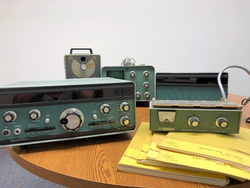
.JPG) "Even though digital modes other than RTTY have been permitted in the RTTY Roundup for 30 years, FT8 was excluded in 2018, because it could not manage the required exchanges," ARRL Contest Branch Manager Bart Jahnke, W9JJ, said. "Through the work of the WSJT-X development team, the latest version of FT8 can handle the necessary exchanges that earlier versions were unable to do."
"Even though digital modes other than RTTY have been permitted in the RTTY Roundup for 30 years, FT8 was excluded in 2018, because it could not manage the required exchanges," ARRL Contest Branch Manager Bart Jahnke, W9JJ, said. "Through the work of the WSJT-X development team, the latest version of FT8 can handle the necessary exchanges that earlier versions were unable to do."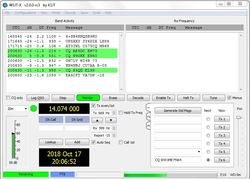 American time zones). Use dial frequency 7.078 kHz, moving up in 2 kHz increments if interference is too great.
American time zones). Use dial frequency 7.078 kHz, moving up in 2 kHz increments if interference is too great.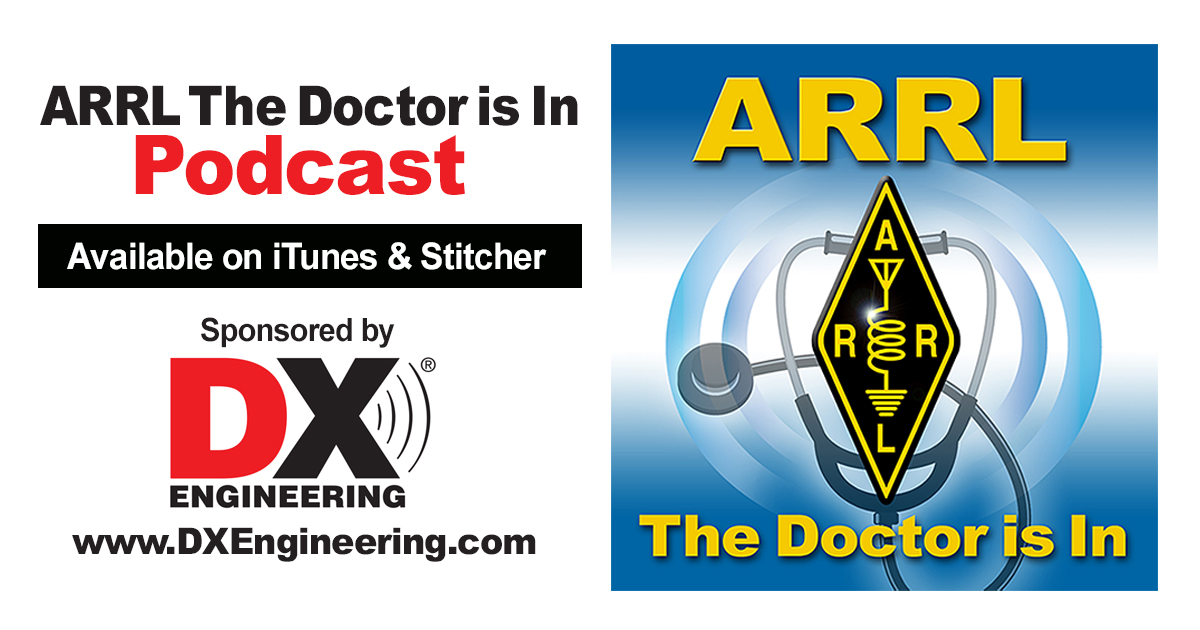 Sponsored by
Sponsored by .png) One site that will be activated for JOTA is the
One site that will be activated for JOTA is the 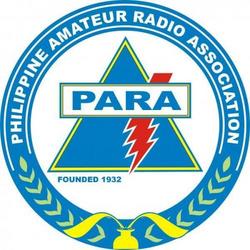 "This year's JOTA/JOTI will not only be done via the traditional RF, but also with the use of the new digital modes C4FM, D-STAR, DMR, and possible demonstration of JS8Call," Vicencio said. JS8Call (formerly FT8Call) is a derivative of WSJT-X, restructured for keyboard-to-keyboard messaging. It is neither supported nor endorsed by the WSJT-X development group. Vicencio said technological advances and growth in Amateur Radio in the Philippines could make this a breakout year for JOTA-JOTI there.
"This year's JOTA/JOTI will not only be done via the traditional RF, but also with the use of the new digital modes C4FM, D-STAR, DMR, and possible demonstration of JS8Call," Vicencio said. JS8Call (formerly FT8Call) is a derivative of WSJT-X, restructured for keyboard-to-keyboard messaging. It is neither supported nor endorsed by the WSJT-X development group. Vicencio said technological advances and growth in Amateur Radio in the Philippines could make this a breakout year for JOTA-JOTI there. October 16. The DXpedition is scheduled to begin on October 20 and continue until November 3. VP6D will use
October 16. The DXpedition is scheduled to begin on October 20 and continue until November 3. VP6D will use .jpeg)
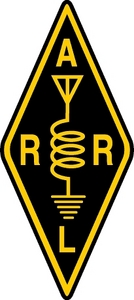 affected by the upgrade was the ability of certain logging software running under Windows 7, 8, and 10 to continue downloading ADIF reports from Logbook of The World (
affected by the upgrade was the ability of certain logging software running under Windows 7, 8, and 10 to continue downloading ADIF reports from Logbook of The World (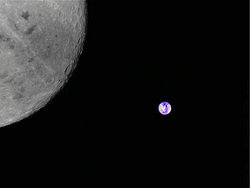
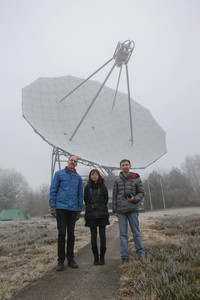
%20Portrait.jpg) US Senator Again Spotlights Ham Radio's Disaster Response Role. US Senator Roger Wicker of Mississippi has
US Senator Again Spotlights Ham Radio's Disaster Response Role. US Senator Roger Wicker of Mississippi has 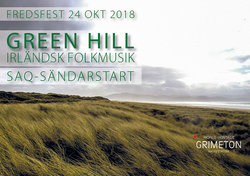 SAQ Alexanderson Alternator Transmission to Celebrate UN Day. An Alexanderson alternator transmission from Sweden's Grimeton Radio Station, SAQ, will be part of UN Day festivities on October 24 at the World Heritage Site in Grimeton, Sweden. A "Peace Party" at the site will feature Irish folk music from the Swedish band Green Hill. The music style honors the first transatlantic telegraph cable between Ireland and Newfoundland, which opened for telegram traffic in August 1866. "We celebrate this great event in international relations by sending out a peace message to the world with the long-wave transmitter SAQ, and then a concert in the Irish folk spirit with the Varberg band Green Hill," the announcement explained. The SAQ CW transmission will be on 17.2 kHz and start at 16:30 UTC. A live
SAQ Alexanderson Alternator Transmission to Celebrate UN Day. An Alexanderson alternator transmission from Sweden's Grimeton Radio Station, SAQ, will be part of UN Day festivities on October 24 at the World Heritage Site in Grimeton, Sweden. A "Peace Party" at the site will feature Irish folk music from the Swedish band Green Hill. The music style honors the first transatlantic telegraph cable between Ireland and Newfoundland, which opened for telegram traffic in August 1866. "We celebrate this great event in international relations by sending out a peace message to the world with the long-wave transmitter SAQ, and then a concert in the Irish folk spirit with the Varberg band Green Hill," the announcement explained. The SAQ CW transmission will be on 17.2 kHz and start at 16:30 UTC. A live 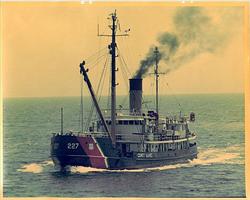 US Coast Guard Auxiliary to Hold "Radio Day" on the Lilac. To commemorate the 79th anniversary of the
US Coast Guard Auxiliary to Hold "Radio Day" on the Lilac. To commemorate the 79th anniversary of the 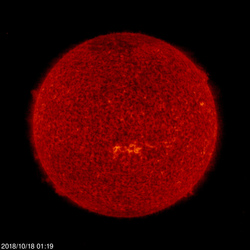 Predicted solar flux is 70 on October 18 - 23; 68 on October 24 - 25; 69 on October 26 - November 4; 70 on November 5 - 7, rising to 72 on November 8 - 17; 70 on November 18 - 20, and 69 on November 21 - December 1.
Predicted solar flux is 70 on October 18 - 23; 68 on October 24 - 25; 69 on October 26 - November 4; 70 on November 5 - 7, rising to 72 on November 8 - 17; 70 on November 18 - 20, and 69 on November 21 - December 1.







